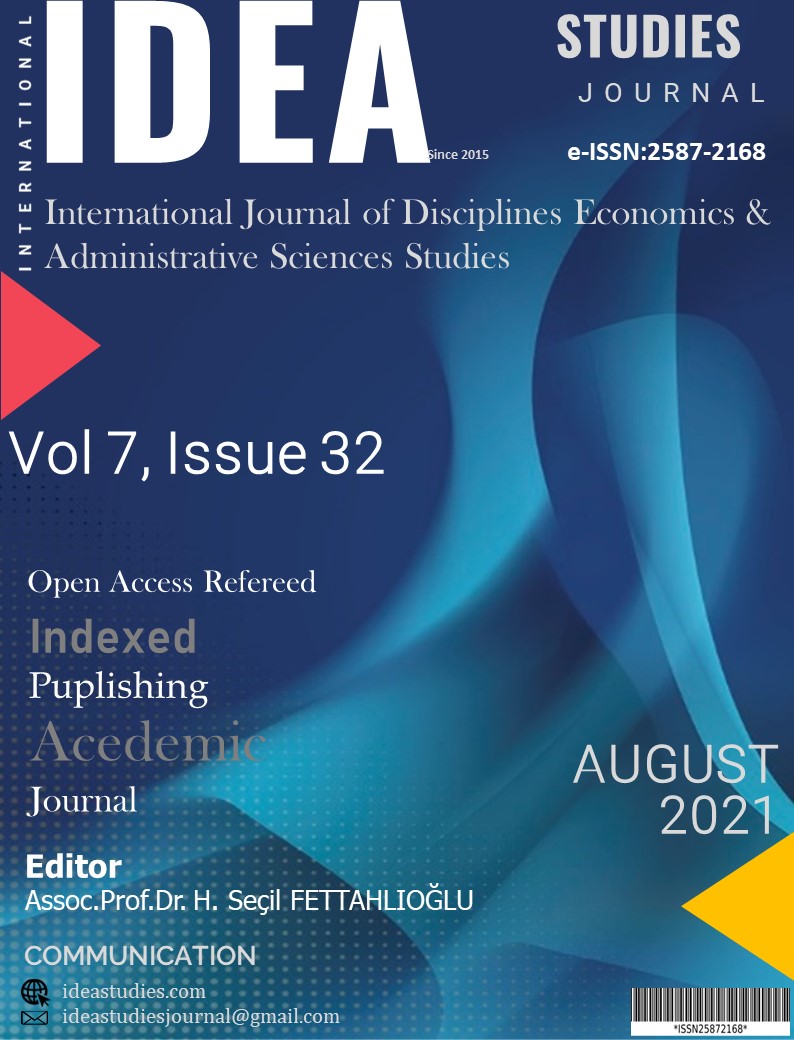Author :
Abstract
Dünyanın en büyük yirmi ekonomisi arasında yer alan ve gelişmekte olan bir ülke Türkiye, 2001 krizinden sonra 2013 yılına kadar hızlı bir büyüme trendine girmiş ve özellikle üretim, milli gelir, ihracat, bütçe dengesi, fiyat ve kur istikrarı açısından önceki dönemlere kıyasla oldukça iyi bir makroekonomik performans sergilemiştir. Bunda 2001 krizinden sonra TCMB’nin bağımsız hale getirilerek fiyat istikrarı hedefine odaklanmasının sağlanması, para politikasının şeffaf ve hesap verebilirliğinin artırılması, mali disiplinin gerçekleştirilerek faiz dışı bütçe fazlasının yükseltilmesi, finansal piyasaların gelişmişliği ile derinliğinin artırılması, özelleştirmelerin tamamlanması gibi yapısal ve kurumsal reformlar ile Güçlü Ekonomiye Geçiş Programı’nın başarılı bir şekilde uygulanmasının büyük rolü olmuştur. 2013 yılından itibaren ise reform kapasitesinin yitirilmesi, yurt içi ve yurt dışı kaynaklı olarak yaşanan negatif şoklar, jeopolitik risklerdeki artışlar, fiyat ve kur istikrarının bozulması gibi sebeplerle Türkiye’nin makroekonomik performansı zayıflamıştır. Çalışmanın amacı son dönem iktisadi veriler ışığında Türkiye ekonomisinin 2003-2021 yılları arasındaki makroekonomik performansını incelemektir. Çalışmadan elde edilen bulgulara göre Türkiye’nin makroekonomik performansını tekrardan artırabilmesi için enflasyonla mücadeleyi ve fiyat istikrarını sağlamayı temel iktisat politikası hedefi olarak belirlemesi, sıkı para ve maliye politikası ile parasal ve mali disiplini sağlaması, faiz dışı bütçe fazlasını artırması, doğrudan ve dolaylı yabancı yatırımları teşvik edebilmek için güven ortamını iyileştirmesi, cari açıkları kontrol altına alabilmek için döviz kuru istikrarını sağlaması, ihracat ürünleri ile pazarlarını çeşitlendirebilmesi, ara ve yatırım mallarında dışa bağımlılığı azaltması ve bunun için de alternatif enerji kaynakları yatırımlarına ağırlık vermesi gerekmektedir.
Keywords
Abstract
Turkey, a developing country that is among the twenty largest economies in the world, entered a rapid growth trend until 2013 after the 2001 crisis and achieved a very good macroeconomic performance especially in terms of production, national income, exports, budget balance, price and exchange rate stability compared to previous periods demonstrated economic performance. In this, after the 2001 crisis, focusing on the goal of price stability, the central bank independent state by maintaining the provision of transparent and to increase accountability of monetary policy, fiscal discipline, were performed, and the primary budget surplus, increasing privatization, increasing the depth and sophistication of financial markets such as the completion of structural and institutional reforms with a strong economy has been a big part of the transition to the successful implementation of the program. Since 2013, Turkey's macroeconomic performance has weakened due to the loss of reform capacity, negative shocks caused by domestic and foreign sources, increases in geopolitical risks, deterioration of price and exchange rate stability. The aim of the study is to examine the macroeconomic performance of the Turkish economy between 2003-2021 in the light of recent economic data. According to the findings from the study, Turkey's macroeconomic performance and policy to ensure price stability, the fight against inflation to increase again as the goal of basic economic determination, monetary and fiscal policy and tight monetary and fiscal discipline to ensure the primary budget surplus to increase in order to encourage foreign direct and indirect investments of the trust to improve the environment to maintain stability of the exchange rate current account deficits under control in order to get it to diversify its markets and export products, in decommissioning and investment goods, it is necessary to reduce external dependence and to focus on investments in alternative energy sources.
Keywords
- Aslan, Alper ve Ebru Topcu (2018). “İhracata Dayalı Büyüme Hipotezine Yeni Bir Yaklaşım: Türkiye
- Aslan, Alper ve Ebru Topcu (2018). “İhracata Dayalı Büyüme Hipotezine Yeni Bir Yaklaşım: TürkiyeEkonomisi Üzerine Sektörel Bir Uygulama”, Uluslararası İktisadi ve İdari İncelemeler Dergisi, No.20, ss.119-134.
- Bağcı, Erdem ve Mustafa Kerem Börü (2018). “Ekonomik Büyüme ve İşsizlik Arasındaki İlişki: Türkiye’deEkonometrik Bir Analiz”, International Journal of Academic Value Studies (Javstudies), Vol.4, Issue.22, ss.890-897.
- Bahçekapılı, Cengiz (2015). “Türkiye Ekonomisinde 2011 Sonrası Sınırlı Büyümenin Nedenleri Üzerine Bir Analiz”, Marmara Üniversitesi İ.İ.B.F. Dergisi, Cilt.XXXVII, Sayı.I, ss.111-124.
- Bakan, Sumru ve Taner Akçacı (2015). “Parasal Aktarım Mekanizması: Türkiye Ekonomisi İçin Beklenti Kanalının Geçerliliği”, Dumlupınar Üniversitesi Sosyal Bilimler Dergisi, Sayı.44, ss.68-78.
- Cinel, Emek Aslı (2018). “Türkiye Ekonomisinin Kırılgan Yapısı”, Mehmet Akif Ersoy Üniversitesi Sosyal Bilimler Enstitüsü Dergisi, Cilt.10, Sayı.23, ss.57-66.
- Çapık, Eser ve Levent Kösekahyaoğlu (2019). “Türkiye’de Dış Borç-Büyüme İlişkisi: 1985-2018 Dönemi Üzerine Bir İnceleme”, Akademik Araştırmalar ve Çalışmalar Dergisi, Cilt.11, Sayı.21, ss.411-427.
- Erdoğan, Levent, Reşat Ceylan ve Ahmet Tiryaki (2018). “Türkiye’de Uzun Dönem Ekonomik BüyümeninBelirleyicilerinin ARDL, FMOLS, DOLS VE CCR Yöntemleriyle Tahmini”, Hacettepe Üniversitesi İktisadi ve İdari Bilimler Fakültesi Dergisi, Cilt.36, Sayı.4, ss.39-58.
- Göcen, Serdar (2017). “Türkiye’nin 1990-2015 Dönemindeki Ekonomik Performansı Üzerine Bir Değerlendirme”, Marmara İktisat Dergisi, Cilt.1, Sayı.1, ss.61-76.
- Kalkavan, Hakan, Serkan Eti ve Serhat Yüksel (2020). “Türkiye’deki Bankacılık Sektörü, Sanayi Gelişimive Ekonomik Büyüme Arasındaki İlişkinin VAR Analizi İle İncelenmesi”, Akademik Araştırmalar ve Çalışmalar Dergisi, Cilt.12, Sayı.22, ss.56-74.
- Kaya, M. Göktuğ ve Ersan Öz (2016). “Enflasyon, Bütçe Açığı ve Para Arzı İlişkisinin Türkiye EkonomisiAçısından Değerlendirilmesi: 1980-2014 Dönemi”, Yönetim ve Ekonomi Dergisi, Cilt.23, No.3, ss.639-651. TCMB. https://evds2.tcmb.gov.tr/, Erişim Tarihi: 23.07.2021
- Topallı, Nurgün (2015). “Turizm Sektörünün Türkiye’nin Ekonomik Büyümesi Üzerindeki Etkisi: 1963- 2011”, Uluslararası İktisadi ve İdari İncelemeler Dergisi, Yıl.7, Sayı.14, ss.339-352.
- TÜİK. https://data.tuik.gov.tr/, Erişim Tarihi: 10.07.2021
- Yurdakul, Funda ve Mehmet Aydın (2018). “Ekonomik Büyüme ve Dış Ticaret Arasındaki İlişki: TürkiyeÜzerine Bir Uygulama”, Uluslararası İktisadi ve İdari İncelemeler Dergisi, 18. EYİ Özel Sayısı, ss.23-36.





